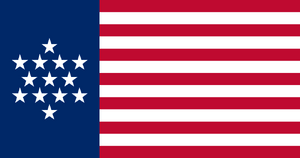
Flag of the American Empire
The United States of America (USA), or simply the United States, was a pre-Collapse federal republic and one of the strongest superpowers. The nation was founded by thirteen colonies of Britain in North America. In 1776, the colonies proclaimed their independence over tax disputes and were recognized as the new nation of the United States of America following the Treaty of Paris in 1783. Although a democratic presidential republic for the first half of its history, the United States was placed under a dictatorial government after the Great War and from this point onward was known colloquially as the American Empire. After the Collapse, several governments claimed to be the legitimate successor to the old Empire, but of these claimants the Coalition of Western Republics became the most powerful.
History
American history can be divided on the basis of three “phases” of Manifest Destiny, or expansion. The first phase saw the United States as a republic expand to the Pacific Ocean. The second occurred during the Great War saw the rise of the Empire as a true colonial power. The third occurred during the Cold War and was defined by American expansion into outer space.
The War on Treason
In 1868, few years following the aftermath of the American Civil War, President Andrew Johnson was successfully impeached by Benjamin Wade, who became his successor. Under Wade, the Wade-Davis Bill was passed, leading to increased tensions between the northern and southern states, as well as increased militarization. The American government fell under the strong influence of the Radical Republicans who strongly condemned the former Confederate States of America despite President Ulysses S. Grant's attempt to re-conciliate with the southern states came null. In response to the hostility of the southern states the American public believed that the South wasn't truly sorry for the "War on Treason" and was still attempting to rise again. Later with the presidential succession of Schuyler Colfax, the Colfax administration implemented a conventional war and series of counter-guerilla operations on the South in ensuring to root out "Redeemer" (as the pro-Confederate movement called itself) influence within the Southern government. Afterward, President Colfax gradually relaxed the requirements for re-admittance to the Union.
New Imperialism
In the follow-up of the War on Treason, the military buildups in the post-war United States began to concern the other nations on North America, especially the British in Canada. Consequent military buildups by both Britain and the United States led to increased tensions between the two. The United States never forgot Britain’s friendly attitude toward the Confederacy (even though the British never gave them any substantial support). Slowly the U.S. began to gravitate diplomatically toward Russia, Britain’s rival in the Great Game (a competition between the two powers for influence in the Middle East). Russia and the United States were cordial in the past: Russia had supported the Union during the War of Treason and had sold Alaska to the United States in 1867. The rivalry would prompt the United States to build up and modernize its navy, a factor that would later come beneficial in the Spanish-American War and the Japanese War. However, even though the two English-speaking nations grew further apart, they didn’t wage war against one another until the Great War.
With America victorious in the Spanish-American War, the success of militarism was taken for granted; both the leadership and populace supported the use of the large, industrialized military to curb diplomacy in their favor. In showing the power of the U.S., America considered the war over Korea between Russia and Japan to be a possible venue to send that message. The war hawks reasoned that if the United States military was threatening enough to cull one of Great Britain’s allies, then Europe’s powers would be impressed. However, many in the government doubted the viability of this plan. Many did not want to go to another war in Asia so soon after the one against Spain; others pointed out that Japan was hardly a great power, and threatening a formerly isolationist Asian nation would make the US look like an opportunistic bully. However, President Theodore Roosevelt instead struck a compromise: the U.S. would allow Russia to use its ports, fire upon any Japanese ship crossing into US territorial waters, and try to negotiate a peace between Japan and Russia, with the treaty leaning to Russia’s favor.
When a Russian fleet limped to Alaska from the disastrous Battle of the Kuril Islands in January of 1903, a Japanese fleet followed in pursuit in an attempt to destroy the last vestiges of Russia’s Pacific navy. During the retreat, the Japanese found themselves in a battle with the USS Arizona, which was assigned by the U.S. Navy to ensure the safe passage of the Russian fleet. The Arizona was sunk by the Japanese in the battle. Only a few American sailors survived; most died of hypothermia. As a result, the details surrounding the battle were murky. The Japanese claimed that the Arizona had pursued them and fired upon them with no provocation. The U.S. claimed that the Japanese had crossed into U.S. territorial waters and had only fired on the Japanese after they were warned and refused to leave. Naturally, the Russian eyewitnesses vouched for America. It was by this reasoning that the United States declared war on Japan, citing an unjust attack which resulted in American deaths. The other nations saw the sinking as an excuse for the Americans to prove themselves in the Pacific; some individuals posited that the sinking was an American conspiracy. Nonetheless, the United States entered the war in full force, quickly supplementing the slowly collapsing Russian Pacific Fleet, and winning the war in the Russian's favor.
During the outbreak of the Kaiser's War, the U.S. opted to stay neutral and made deals with both the Entente and Central Powers. Because of long-standing rivalry, ship sinking by the British and the demonstration of its martial ability, the United States became closer to the German Empire in the interwar era. In the aftermath of the Kaiser's War, America embraced a nationalistic movement of national conservatism. Nationalist rule over America was only strengthened by the Great War, which saw the gutting of what remained of the Entente colonial empires. The United States gained British Canada, South Africa, Egypt, large portions of the Middle East and India, Indochina, the East Indies, Japan and Corea. Bolstered by renewed ideas of Manifest Destiny, living space and various social and racial theories that now had many test subjects, American rule was defined by uncompromising totalitarianism. The conquest of Latin America and the creation of Fortress America occurred during the 1960s.
By June 1965, then President Jack Miller was assassinated by unknown assailants that changed Americans' opinions into seeing that American democracy as being ineffective and fosters only division and chaos in the face of its Cold War with Germany and the Soviet Union. Combined with Jack Miller's death and the growing anti-German and anti-communist atmosphere, the American Republic was reformed into the American Empire.
Imperial America
The Collapse
Post-Collapse
Government
Although the Founding Fathers did not anticipate it, the Old Republic developed into a two-party system thanks to its electoral system. The two most prominent political parties in the pre-Imperial 20th century are the Republicans and Progressive-Populist parties. Both arose from the Republican Party after the destruction of the Democrats after the War on Treason and were subsumed by the National Union party, which quickly became the only legal party with the formation of the Empire.
Republican Party: The Grand Old Party that won the War on Treason, the Republicans were originally a "Northern" party united in their opposition to slavery. After the war, the rise of the Populist-Progressives alienated the industrialists that controlled the party, causing a split. By the 20th century, the Republicans were firmly for capitalism, government aid to big business, isolationism, and the return of prosperity to their old political competition, the Southern planter class. The Republicans were most famous in the cities of the Northeast. The most prominent Republican presidents were John Rockefeller and Henry Ford.
Populist-Progressive Party: Arising from the progressive wing of the Republican Party, the Populist-Progressives were a union of liberated black slaves and poor rural whites in the Midwest. The core of the party was those of the radical Republicans, who broke off when their more conservative brethren began to ask for the return of rights of former Confederate planters in order to acquire cotton for their textiles and the increasing monetary conflicts between urban bankers and rural farmers. Throughout its history Populist-Progressives called for more government intervention to benefit poor farmers, social justice, environmental conservation, prohibition, trust busting, public education, the liberation of other nations from oppressive European regimes, increased civil rights and the maintaining of anti-Confederate laws in the South. The Populist-Progressives were the most popular in the South and Midwest.
National Union Party: The party formed by Marcus Hill during the Great Emergency, the National Union Party is less a political party than it was Hill's personal fan club. It was formed in reaction to the growing "New Populism" that made millions of Americans, mostly youth, take to the streets and protest American military action in Central America, the Middle East and the Japanese genocide. The National Union Party had no platform save its name: national union at all costs. Shortly after the formation of the party and the forced membership of every member of the United States government into it, the National Union party was made the only legal political party in the United States. It was eventually abolished by Emperor Wilkinson during the Recession of 2077 as it was becoming a forum for opposing his policies.
